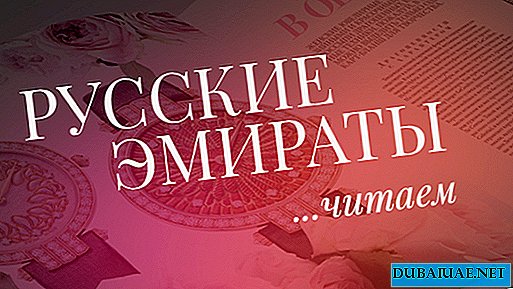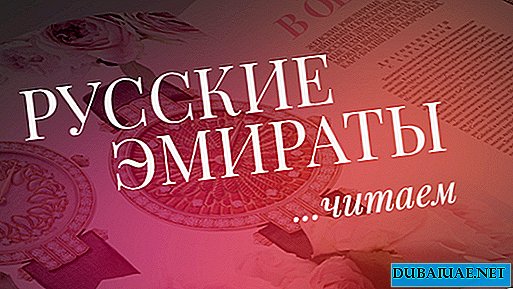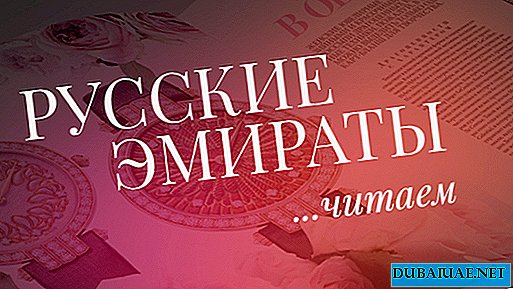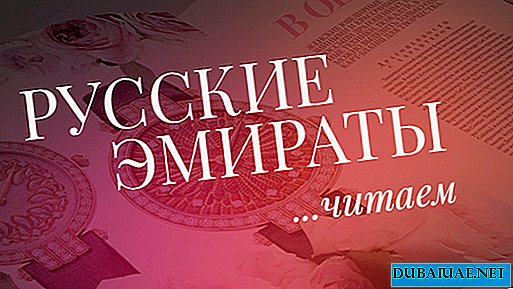Muslim holidays. "What is the use of night if there are no stars in it"?
 Nearing the end of the 1428th Muslim year, a series of Islamic holidays was opened. Muslims celebrated Eid ul-Fitr (Feast of Conversation) in October for three days. After a hard day, which lasted for a month during the 40-degree heat, the Emirate’s society relaxed and matured.
Nearing the end of the 1428th Muslim year, a series of Islamic holidays was opened. Muslims celebrated Eid ul-Fitr (Feast of Conversation) in October for three days. After a hard day, which lasted for a month during the 40-degree heat, the Emirate’s society relaxed and matured.
One of the main celebrations of the Muslim year came on October 13 with the first dawn of the lunar month of the shawal, who raised his silver boat on the night's cover of that day, marking the end of ramadan.
In the Islamic community of the world there are two traditional annual religious holidays common to all Muslims - full of worship, good, satisfying and cheerful for every Muslim, regardless of his position in society and the state of his wallet. The whole Muslim community is called by the canons of faith to make holidays joyful for everyone.
Foreigners who live in the Emirates for a long time are no longer surprised when a doorbell rings, and embarrassed, elegant children offer them dishes with cooked treats - Allah orders to share food.
It would seem that in comparison with the Christian calendar, there are few holidays in Islam. But, firstly, they last 3-4 days, and in some cases in some countries even more than a week, and, secondly, every Friday is considered a holiday, which is, in fact, the third holiday that occurs weekly.
Everyone is involved in local religious festivals - from small to large. Moreover, Islamic theologians (ulema) argue that the holidays "remembrance of Allah, thanksgiving, forgiveness and generosity" are celebrated in paradise, whose inhabitants meet with morning dew, and later with evening coolness meet Allah.
Each of the holidays in Arabic is called "id." The celebration following the conversation comes ten weeks after the first religious celebrations of the year. On the tenth day of the last month of the Hijri year, “zu-likhidja,” at the beginning of which a mandatory pilgrimage to Mecca for Meccan is made, another triumph occurs - “Eid ul-Adha” (Feast of Sacrifice).
The basis of the word "id" is the verb "aada" (return, visit, visit). Arab philologists say that the holidays are called "Ides" because "they come back every year with new joys." The name of the feast of conversation dates back to the Arabic root of "fatara" - to have breakfast, interrupt fasting, talk. This is the first day that Muslims eat and drink in the afternoon after fasting. A spiritual festival serves as a reward for a body that has undergone physical tests.
Muslim holidays have their own special pathos, religious content and a purely family mood. There are general regulations and prohibitions. It is based on the tradition instituted by the Prophet Muhammad ibn Abdullah.
The holiday begins with breakfast. A Muslim can have breakfast with dates, and theologians recall that the prophet ate them in an odd amount. For breakfast, a birthday cake with dates, wheat, rice, and other products can be served. The festive conversation ends with the exaltation of the Lord. "Allahu Akbar"!
The glory to Allah, begun on the pre-holiday night, continues throughout all three solemn, blessed days. The bigger, the better!
The unified phrase of praise is canonized in the form used by the prophet. It consists of the triple glorification of Allah with the cries of "Allahu Akbar" (Allah the Great). This is followed by the recognition of the uniqueness, uniqueness of the Divine, the recognition that put an end to the Arabian idolatry of the times of "ignorance" - "La Ilaha illa-alla (There is no God but Allah) and the praise of the Lord -" Allahu Akbar wa-lillahi hamad "(Allah the Great and Allah praise).
Each faithful should praise in a voice and independently, without copying anyone, without repeating anyone. Only in this way he personally glorifies Allah, confirms his own worship of Him and thanks Him.
It is impossible to chant words in chorus or repeat after someone in the name of preserving the individuality of spells. In addition, theologians do not advise adding anything to these praises.
Religious historians note that the prophet uttered these phrases all the way to the place of creation of the first holiday prayer, and all Muslims should do just that.
Holiday prayers are performed in open air about 20 minutes after sunrise, when it "rises one horizon" above the horizon. Praying in mosques is allowed only in adverse weather conditions, in case of rain, for example. An exception is made only for residents of Mecca. For them, mosques are open on holidays.
Prayer should be walked along any path, but you need to return after it along a different path so that the praise continues as long as possible. At the same time, everyone participates in the procession - children, women, without exception, including adults, unmarried girls. Representatives of the harem sex, however, go separately from men. The prayer reads "Fatih", revealing the Qur'an of the Surah, and certain surahs selected from it for festive occasions.
According to the tradition established by the prophet, a Muslim must wash himself before a prayer, put on new or freshly washed clothes, and scent. Shaving, cutting hair, cutting nails is not recommended. Women are not allowed to strangle and dress up too much, so as not to cause interest and sympathies inconsistent with the attitude of God to the opposite sex.
Excess in the holidays is generally not welcomed either in food, or in alms, or in sacrifice, but all-round zeal in praising Allah is approved.
On a holiday, you can visit the graves of loved ones, but bringing flowers, wreaths, sweets to the cemetery is not recommended. The Prophet said: “Visit the graves, as they remind you of the next life,” which comes after death. Women should not be in cemeteries, lest sorrow enter their tender hearts.
In order not to overshadow the days of joy, you should not visit houses whose families have recently taken one of their relatives on their last journey.
 The use of greeting cards is not welcome, as this tradition is considered Christian. Shaking hands between men and women outsiders is prohibited. It is not recommended to spend extra money on entertainment with noise effects. These funds are best given to the poor, orphans, widows and needy. Playing cards and other gambling during the holidays is considered a great sin. It is forbidden to make funny, secular chants, drink alcohol, listen to music, dance and arrange long walks, because of which you can oversleep the morning prayer of tomorrow. In no case should one appropriate another's good!
The use of greeting cards is not welcome, as this tradition is considered Christian. Shaking hands between men and women outsiders is prohibited. It is not recommended to spend extra money on entertainment with noise effects. These funds are best given to the poor, orphans, widows and needy. Playing cards and other gambling during the holidays is considered a great sin. It is forbidden to make funny, secular chants, drink alcohol, listen to music, dance and arrange long walks, because of which you can oversleep the morning prayer of tomorrow. In no case should one appropriate another's good!
The holiday is celebrated with the phrase: “Takabbal Alla minna wa-minkum” (Yes, Allah hearketh to us and you) or its simplified form “Takabbal Alla” (Yes, Allah hears). Answer the same. This welcome ritual has been living since the time of the Prophet Muhammad and his closest associates, who congratulated each other on holy, joyful days. They also say as a greeting "Idukum Mubarak" (Blessed holiday to you) and "Kullu aam wa-antum biheir" (All year good to you).
Holidays are days of eating, drinking and remembering Allah. Fasting during festivities is prohibited. They should be days of satiety, joy and fun, visiting and receiving relatives, immediate neighbors, friends, sympathy for the poor. You can’t continue the previous discord. Affectionate love can only be your own wife. Men are not allowed to meet outside women. The holiday embodies the social, philanthropic essence of Islam. It serves to show joy, forgiveness, accompanied by permitted entertainment and drumming.
Even before the holiday prayer, a Muslim must pay tribute to the conversation (sunset ulfitr) - tithe. It is believed that it provides fasting cleansing. Making tribute is the duty of every member of the community. It can only be brought in with food. Anyone who is generous with money should give something to eat. Adherents of the Hanifit persuasion allow the introduction of sunset money.
The Prophet Muhammad recommended, as a tribute to the conversation before the prayer, "a measure of dates, a measure of barley, wheat or rice from every slave and free, male and female, large and small of Muslims." (The Arabic measure of loose bodies, called "saa", is four handfuls of a middle-aged man, which, when measuring wheat, is equal to 2176 grams). Contemporaries of the prophet say that they also gave a measure of cottage cheese, a measure of raisins. It is enough to do this for one poor man. "Feed the poor" is the main thing.
It is not recommended to give the sunset to relatives, neighbors, exchange the sunset or give it to the same people every year, regardless of their financial situation. Tribute can be sent to other cities and countries if there are no poor people at the place of sunset. Sunset can be granted on any Ramadan day, and not only to Muslims, but also to representatives of other faiths who live among the Muslim community.
The head of the family can make a sunset for everyone, but it is better if each family member does it on their own a day or two before the holiday. What is donated before the prayer is sunset, but what is served after it is already alms. Therefore, the manifestation of generosity should not be delayed. The latest sunset time is the holiday prayer.
Another thing is Eid al-Adha (Feast of Sacrifice). If the sunset is distributed before the prayer, then sacrifices are made only after it. A hastened one, ahead of the prayer must complete the slaughter again. Sacrifices are made within 4 days, starting from the 10th Zu-l-Hijjah, immediately after the “Great Standing” of pilgrims on Mount Arafat, which is the main sacred action of the Hajj. The first day of sacrifice is called Yaum al-Nahr (Slaughter Day).
The festival of sacrifice begins with prayer and sermon. Then a sacrifice is made. She goes for breakfast. Those who could not make a sacrifice on the first day do this on the second and third days. Sacrificial meat is eaten by the donor himself, distributed as alms and procured for the future.
You can’t sell it. A third goes to the donor, a third to the poor and a third to friends. Everyone who is affluent, free and slaves, men and women, married and single, not only in their settlement, in their family and their home, but also traveling travelers, should donate. The poor may not participate in the sacrifice.
The ritual of sacrifice was transferred to Islam along with the legend of Ibrahim (Abraham), borrowed from the biblical story. In times of ignorance, victims were brought right near the Kaaba and hung meat on it. This is long over. Over the past decades, sacrifice in the holy places of Islam in Saudi Arabia has been absolutely centralized and carried out in state slaughterhouses. In the Emirates, the killing of animals outside specially designated places for this is stopped.
You can donate a lamb from the age of six months, a one-year-old kid, a 5-year-old camel and a 4-year-old cow. Poultry does not belong to the "blessed animals" and cannot be a sacrificial gift. Sheep and goats in the countries of the Arabian Peninsula are considered more preferable victims than camels and cows. In a number of countries, the donation of a 5-year-old camel comes first. The camel's choice is followed by the slaughter of a cow, and only then - sheep or goats. Sacrificial animals should not have physical defects. Veterinarians check ears, teeth, eyes, legs and even the tail, reject defective animals.
The Feast of Sacrifice in Russia is known in the Turkic name "Kurban Bayram", where Kurban is the victim, and Bairam is the holiday. Among the Arabs it is called Eid al-Adha. The essence of the name is the same. In some countries, elements of the Turkic and Arabic names are combined, for example, "Kurban Nut" in Kazakhstan and "Eide Gorban" in Iran. Sacrifices are everywhere brought with the words facing Mecca, "God! From you and you! Accept!"
The main events of the festival take place in the vicinity of Mecca in the Mina Valley, which was the first place to slaughter sacrificial animals. Its entire territory is declared by the Prophet Muhammad "Altar of Allah." He himself, two months before his death in 632, sacrificed 63 camels here - one for each year he was nearing the end of his life.
On behalf of the then nine wives who accompanied him, he sacrificed cows. “Drink and eat and enjoy,” the prophet proclaimed. The successors of Muhammad at the head of the first Islamic state - the Caliphs — slaughtered seven dozen camels on the day of the sacrifice at the entrances to their palaces in Damascus, and then in Baghdad and Cairo. Sacrificial meat was handed out for atonement for all who wish and bring congratulations.
Sunset and sacrifice are the material duties of a Muslim, designed to make religious celebrations happy for all members of the community. Holidays color the year. "What is the use of the night if there are no stars in it," say the Arab sages.








